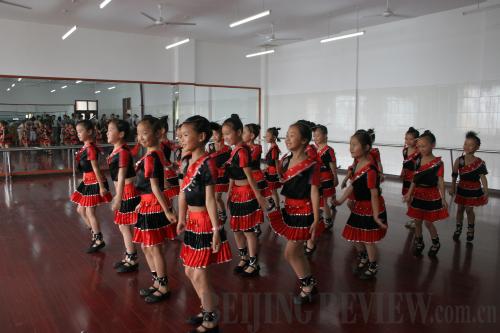|
 |
|
ETHNIC CULTURE IN EXERCISE: Ethnic Primary School of Enshi Prefecture creates a set of folk dance exercises and students spend lots of time passing on the intangible ethnic heritage (PING NA) |
Wang Sirui, 8, is a grade-3 pupil at the Ethnic Primary School of Enshi Tujia and Miao Autonomous Prefecture (shortened as Enshi Prefecture), central China's Hubei Province. Although from the Tujia ethnic group, the little girl knew little about the Tujia culture before she came to study in the school in 2008. During the past two years, she has had a dance class every week and now the girl can skillfully perform dances of her ethnic group and knows much more about the culture.
Enshi Tujia and Miao Autonomous Prefecture, with a population of 3.95 million, is the only autonomous prefecture of Hubei. Of the total population, 53 percent are from different ethnic groups. As the city grew and the floating population increased, the educational resources fell short of need. To improve this situation, Enshi Prefecture Government decided to set up a new primary school.
As part of the campaign launched by the Hubei Provincial Government in August 2007 to offer aid to the areas inhabited by ethnic minorities, 5 million yuan ($738,550) worth of supporting funds was allocated from the provincial departments of education and finance to set up an ethnic primary school in the prefecture.
With a floor space of 20,000 square meters, Ethnic Primary School of Enshi Prefecture was completed in the fall of 2008, enrolling 2,015 pupils in 31 classes. The school tries to inherit and pass on traditions of major local ethnic groups.
"The architectural style of the school reflects the characteristics of the major ethnic groups of our prefecture," said Yuan Min, headmaster of the school. The design of the school showcases local characteristics. With the keynote feature of white walls and black tiles used by houses in the province, the school's buildings combine modern and traditional architecture.
The school has also gone to great lengths to pass on intangible ethnic heritage. Yuan says the school compiles its own textbooks and every pupil has a class focused on ethnic knowledge every week. Moreover, the school also offers every pupil a free ethnic costume.
 |
|
HAPPY DANCERS: Girls of Ethnic Primary School of Enshi Prefecture learn the folk dances of the Tujia ethnic group. They have folk dance classes every week (PING NA) |
Yuan also says the school holds a yearly cultural festival where pupils learn songs and dances of Tujia and Miao ethnic groups, participate in a picture competition to describe life of the groups and make posters of food, customs and other cultural aspects.
The Tujia people are well known for a hand dance with more than 70 ritual gestures to indicate war, hunting, farming and feasting. The dance is particularly popular at the Spring Festival when thousands of people participate.
The school also creates a set of folk dance exercises, which incorporate elements of hand dancing and many other folk dances of the Tujia and Miao ethnic groups. By doing these exercises, pupils can easily learn many folk dance movements.
Improve the vocational skills
Jiang Xi is a student of the Secondary Vocational School of Laifeng County, Enshi Prefecture, majoring in electronics. The 17-year-old Miao teenaged boy is exempt from tuition fees, and his family only needs to pay about 3,600 yuan ($598) worth of boarding expenses each year. After graduation, he doesn't need to worry about job, because graduates of his major can find jobs in electronics factories in Shenzhen and Dongguan of south China's Guangdong Province, or in local electronics factories.
| 